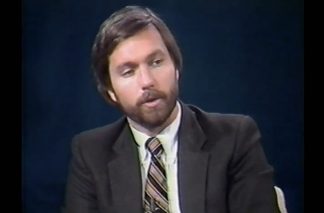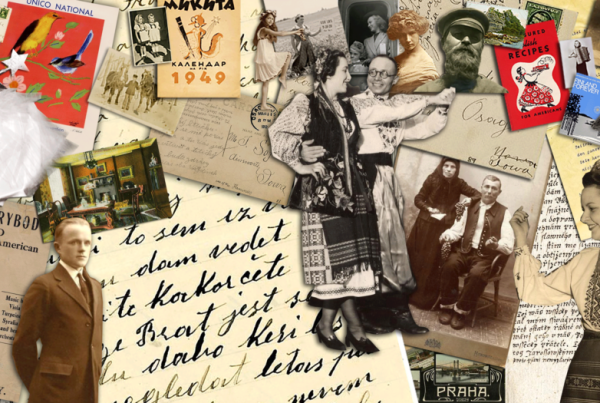By Linnea Anderson, Archivist, U of M Libraries Social Welfare History Archives
Some topics in public health never go away, infectious disease and barriers to access to health care among them. In the recently digitized “A Public Health Journal” TV program (APHJ), dating from 1985-2004, and available online via UMedia, students, scholars, public health officials, and the members of the community can explore some of these evergreen issues.
One episode, featuring Dr. Michael Osterholm and Dr. Edward Ehlinger, includes their discussion of how the AIDS epidemic had implications beyond the disease itself, such as individual and civil rights in relation to disease prevention measures; addressing public myths about disease transmission; and the impact of fears around an infectious disease on what they call the “social fabric” of the country. All these themes are relevant in the current COVID pandemic. The episode was taped in 1985.
The 302 digitized episodes are available on the University of Minnesota Libraries’ UMedia digital content site. This new digital resource is available to the public and to scholars from all disciplines, thanks to grant funding from the Minnesota Arts and Cultural Heritage Fund to the Social Welfare History Archives at the University of Minnesota Libraries.
The APHJ recordings are part of the Minnesota Public Health Association records. The local cable program was hosted by Dr. Edward Ehlinger, one-time Minnesota commissioner of health.
The APHJ series is an example of Minnesota’s leadership in the arena of public health and documents the role of Minnesota-based medical and public health professionals, advocacy groups, and government agencies in researching, promoting, and teaching public health and improving community health.
Past episodes, still relevant
The APHJ programs cover numerous topics across nearly two decades, from 1985 to 2004. They provide snapshots of a particular time, but also demonstrate continuity and change in public health theories and practices over time, offering fresh opportunities to engage new audiences or bring new perspectives to these resources.
As with many archival sources, some of the topics discussed reflect historical precedents and issues that remain current and relevant. These include the history of public health programs, medical history, specific diseases and conditions, and the health priorities and challenges of various groups and communities.
Another particularly timely topic is access to health care. The 23 episodes on access to health care cover such issues as: income level and health care access; access to care in rural areas; costs of insurance premiums and the problem of health care that is not affordable even for those with insurance; and single payer and national health care systems. A specific example is a 1990 episode in which guests discuss the issue of health-care costs for low- and middle-income people, with or without insurance, as a social justice and economic justice issue, and reflect on the impacts of this problem on the “common good.”
Examples of other topics that demonstrate the enduring value of this series include: children’s health, parenting and early childhood; adolescent health and sexuality; substance abuse and addiction, including nicotine, drugs, and alcohol; women’s health; preventative health, nutrition, and physical fitness; seniors’ health issues and programs; mental health; disability rights and health; and housing insecurity.
 This publication was made possible in part by the people of Minnesota through a grant funded by an appropriation to the Minnesota Historical Society from the Minnesota Arts and Cultural Heritage Fund. Any views, findings, opinions, conclusions, or recommendations expressed in this publication are those of the authors and do not necessarily represent those of the State of Minnesota, the Minnesota Historical Society, or the Minnesota Historic Resources Advisory Committee.
This publication was made possible in part by the people of Minnesota through a grant funded by an appropriation to the Minnesota Historical Society from the Minnesota Arts and Cultural Heritage Fund. Any views, findings, opinions, conclusions, or recommendations expressed in this publication are those of the authors and do not necessarily represent those of the State of Minnesota, the Minnesota Historical Society, or the Minnesota Historic Resources Advisory Committee.




